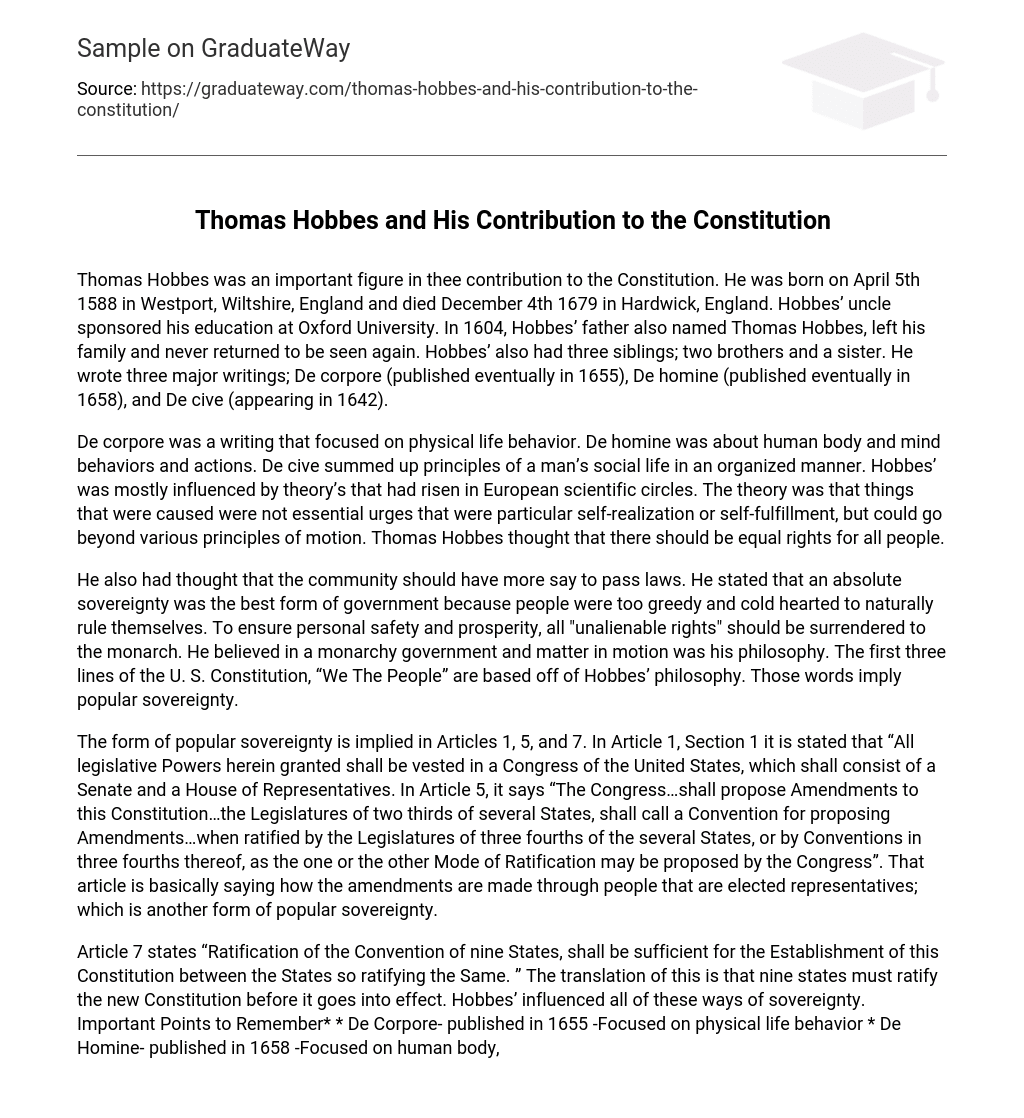Thomas Hobbes, who was born on April 5th 1588 in Westport, Wiltshire, England and died on December 4th 1679 in Hardwick, England, made a significant contribution to the Constitution. His education at Oxford University was financially supported by his uncle. In 1604, Hobbes’ father (also named Thomas Hobbes) abandoned his family and never returned. He had two brothers and a sister as siblings. Hobbes wrote three major works: De corpore (eventually published in 1655), De homine (eventually published in 1658), and De cive (which appeared in 1642).
The works of Hobbes, namely De corpore, De homine, and De cive, focus on various aspects of human existence and conduct. In De corpore, he investigates physical behaviors, while in De homine he delves into behaviors encompassing both the body and mind. As for De cive, it presents principles governing social life. Hobbes drew inspiration from European scientific theories that suggested causation is not solely derived from individual self-realization or self-fulfillment but can also extend beyond principles of motion. Thomas Hobbes advocated for equal rights for all.
Hobbes advocated for greater power of the community in lawmaking. He argued that absolute sovereignty was the most effective form of government due to people’s inherent self-interest and inability to self-govern. To guarantee personal safety and prosperity, individuals should surrender all their “unalienable rights” to the ruler. Hobbes favored a monarchy as the ideal government type, basing his philosophy on matter in motion. The well-known opening words of the U.S. Constitution, “We The People,” were influenced by Hobbes’ ideas and embody popular sovereignty.
The idea of popular sovereignty can be seen in various sections of the Constitution. In Article 1, Section 1, it is stated that “All legislative Powers herein granted shall be vested in a Congress of the United States, which shall consist of a Senate and a House of Representatives.” This indicates that elected representatives have the power to create laws, thereby reflecting popular sovereignty. Additionally, Article 5 explains the process for proposing and ratifying Amendments. It specifies that “The Congress…shall propose Amendments to this Constitution…the Legislatures of two thirds of several States, shall call a Convention for proposing Amendments…when ratified by the Legislatures of three fourths of the several States or by Conventions in three fourths thereof, as the one or the other Mode of Ratification may be proposed by the Congress.” Essentially, this article emphasizes that amendments are made through elected representatives, once again highlighting popular sovereignty.
Article 7 of the United States Constitution declares that the Constitution will become effective upon ratification by nine states. This notion can be traced back to Hobbes, who advocated for absolute sovereignty as the optimal government form. Hobbes’ theories regarding physical and human behavior, social life, and organization are apparent in his works such as “De Corpore,” “De Homine,” and “De Cive.” These philosophical principles greatly influenced the development of Article I, Article V, and Article VII within the Constitution.
The following is a list of references:
* Soylent, Communications. “Thomas Hobbes. ” NNDB. Soylent Communications, 2011. Web.
. * BBC. “Thomas Hobbes (1588-1679). ” Worldwide: BBC, 2011. Web.
* Condren, Conal. “Thomas Hobbes Biography. ” World Biography. Port Washington, NY: Twayne Publishers, 2000. Web.
. * Walenta, Craig. “Political Philosophers: Thomas Hobbes (1588-1679). ” U. S. Constitution Online. 1995-2010. Web.





